
Regional Hub for Latin America and the Caribbean Highlights 2020
Copyright © UNDP 2021 All
Regional Hub for Latin America and the Caribbean
Graphic Design: Fernando Muñoz
rights reserved
United Nations Development Programme
01_
Responding to COVID-19
Mobilizing resources for COVID-19 responses
Gender Equality at the Core
02_
Responding to Country Demands: Integrated Solutions to Advance the SDGs
A Vision for Latin America and the Caribbean:
Our Pillars
Effective governance at the core of sustainable recovery
Governance Pillar
Heat map
Productivity Pillar
Heat map
Inclusion Pillar
Heat map
Resilience Pillar
Heat map
03_
Responding to Implementation with Innovation and Impeccable Administration 04_ Our
Foreword
knowledge
in numbers Page 3 5 5 6 7 8 9 10 11 12 13 14 Content
products
Foreword
2020 is now synonymous with the COVID-19 pandemic. The world came to a standstill and the livelihoods of an entire generation were upended. Human development declined for the first time in 30 years. In real terms, the poorest and most vulnerable members of society are now at even greater risk of being left behind, and the level of unprecedented socio-economic decline is exacerbated by growing inequalities, environmental degradation, a widening gap between developed and developing countries, distrust in political institutions, and skepticism in the social contract.
Yet, human ingenuity and solidarity has been a ray of light in this year of darkness. People, governments, the private sector, and bilateral and multilateral organizations are proving that, collectively, we can recover and build back better from this global pandemic.
UNDP’s Regional Hub for Latin America and the Caribbean has been part of this collective effort, contributing to get our region back on track towards advancing the Sustainable Development Goals (SDGs).
Its role has always been to provide relevant, timely, and quality technical support to UNDP Country Offices in the region so that they can effectively work towards achieving national priorities and thus advance the 2030 Agenda.
The 2020 Annual Report for the Regional Hub provides a regional perspective of UNDP’s support to the socio-economic process driven by the governments and societies of Latin America and the Caribbean. The results summarized in this report showcase integrated and innovative solutions for a recovery that is inclusive, equitable, and sustainable. These results show a clear convergence around three pillars—productivity, inclusion, and resilience—with effective governance as the overarching framework.
Complex problems require complex solutions; but even more so, they require synchronized teamwork. This is the approach that accounts for the Hub’s generation of 510 knowledge products between 20192020, focused on integrated and multidimensional approaches, and in 2020, to address COVID-19 policy challenges.
4 Regional Hub for Latin America and the Caribbean | Highlights 2020
Under the leadership of the Regional Bureau for Latin American and the Caribbean, the Regional Hub continues to build on the momentum of regional recovery to support and provide technical and advisory services in line with the SDGs and the 2030 Agenda. Throughout 2020, the staff of the Regional Hub has made important contributions across all countries and across all pillars of effective governance, productivity, inclusion and resilience, that range from support to enhance national commitments and ambitions for climate resilience, to initiatives that strive to eliminate all forms of violence against women and girls; protect human rights and equal access to justice for all; empower micro, smalml and medium enterprises (MSMEs) to adapt to a new-normal business environment; develop actions plans for greener cities; build regional and national alliances to drive a new vision of effective governance anchored on consensus-based principles; enhance evidence-based policy making on criminal justice and citizen security; innovate management and institutional capacities for policy implementation at local and national levels; champion the socio-economic integration
of refuges, migrants and host communities; and strengthen national responses to social protection, gender equality, social cohesion, digital disinformation, clean energy, nature-based solutions, disaster recovery, and preparedness to natural hazards, amongst others.
I invite you to read the following pages and become familiar with the body of work undertaken by the Regional Hub in 2020. Behind all the numbers are countless stories of people from all backgrounds and disciplines who worked tirelessly and collectively to build a new and improved normalcy where no one is left behind.
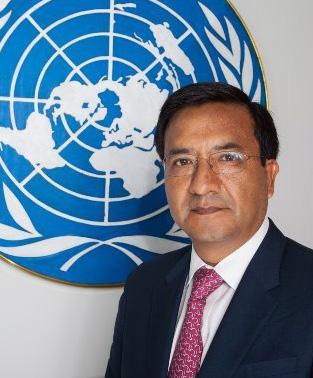 José Cruz-Osorio Manager
José Cruz-Osorio Manager
UNDP Regional Hub for Latin America and the Caribbean
5 Regional Hub for Latin America and the Caribbean | Highlights 2020
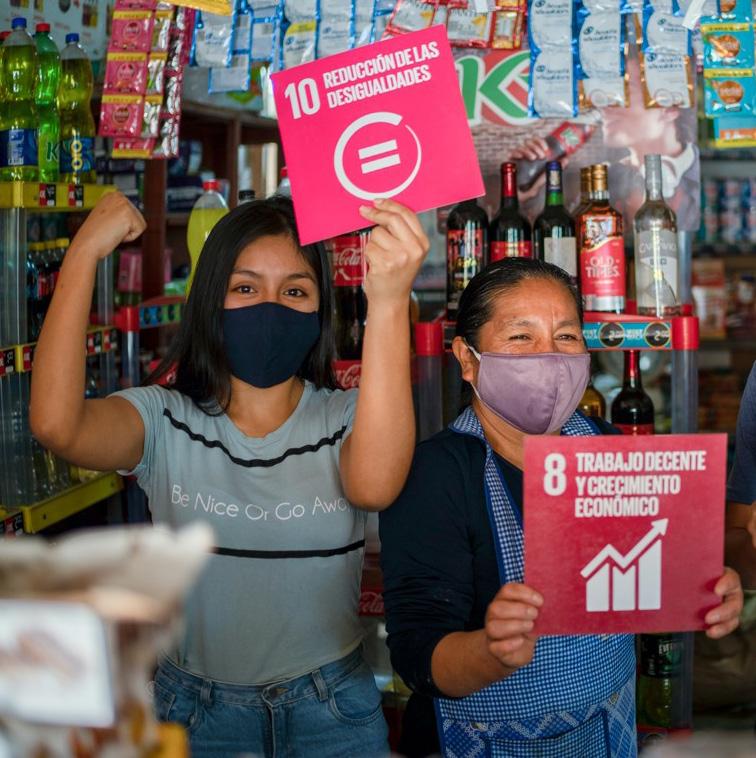
Responding to COVID-19
01_

Any regional report for 2020 would be remiss if it did not address first and foremost the single most impactful event of the year: the COVID-19 pandemic. This global health crisis challenged every aspect of the region’s economies, social structures, environment, and government functions. The resulting crisis has disproportionately affected populations that are particularly vulnerable to socioeconomic shocks, such as the poor, the elderly, people with disabilities, and women and girls. Gender inequalities have been exacerbated with women, who have found themselves exposed to increased care workloads, greater restrictions on labor participation, and increased violence.
The UNDP addressed the pandemic at the regional level in a variety of different ways. First, it helped governments in the region understand how COVID-19 was affecting the fabric of society, producing strategic reports and evidence-based policy options. Examples include knowledge webinars exploring the impact of COVID-19 and migration, and the role of the private sector in the recovery process. Assessment tools were created to help measure socio-economic effects and roll out social protection programmes. And nearly 100 prominent experts from 26 LAC countries were convened to develop the document “LAC: Effective Governance, beyond Recovery” with 8 principles and
7 Regional Hub for Latin America and the Caribbean | Highlights 2020
5 propositions to address the COVID-19 pandemic from a governance standpoint. Second, it assisted UNDP Country Offices and governments to adjust the implementation of their programmes, projects, and actions to minimize the impact from issues such as contagion, lockdowns, and social distancing. An excellent example of such work can be found in the four analytical methodologies on Conflict Systems under the COVID-19 context. These were developed for the Southern Cone, Andean, Central America, and Caribbean subregions to understand the common axes and challenges of pre-existing conflict. Inputs from 22 countries contributed to identifying the main areas of intervention for strengthening the capacities for social cohesion and conflict prevention.
The Hub also continued to support Country Offices in LAC for the execution of large programmes under the climate and nature portfolio, essentially funded by the Global Environmental Facility/Green Climate Fund (GEF/GCF) adaptation fund. Great efforts were made regarding the mobilization of financial resources to promote the climate and nature agenda in the context of national discussions related to the post-COVID-19 socioeconomic recovery strategies. In that regard, particular attention was put in advancing the discussion in the region on the importance of pro-
moting a low-carbon and climate-resilient green recovery approach.
Most importantly, the Regional Hub prioritized actions to ensure that no one was left behind in both the response to the pandemic and strategic planning for recovery. Exacerbating factors such as gender, migratory status, living with HIV, and disabilities were integrated into the planning and implementation of COVID-19 related actions. Thus, countries in the region were supported to develop, build, and strengthen national/local care systems; and regionally developed tools were offered to integrate gender and other factors into national COVID-19 responses. The UNDP gender-sensitive methodology for COVID-19 responses had a comprehensive approach that included gender-sensitive assessments, surveys, inclusive financing, SDG policy mapping via Rapid Impact Assessments (RIA), gender-focused social protection, private sector participation, violence against women and girls (VAWG) responses, and the promotion of digitalization to address women’s structural inequalities.
8 Regional Hub for Latin America and the Caribbean | Highlights 2020
Mobilizing resources for COVID-19 responses
UNDP’s Rapid Financing Facility (RFF) was launched in July 2020 as part of the organization’s Beyond Recovery Offer. As the pandemic started, pre-existing socio-economic conditions such as poverty, insecurity, weak governance, and fragile infrastructure in low-and middle-income countries threatened to exacerbate the impact of COVID-19 if not immediately addressed. Thus, the UNDP’s Rapid Response Facility aimed to help expedite and facilitate this urgent support. UNDP made available an
additional US$100 million of funding to Country Offices to help them leverage strategic partnerships and additional resources to support national recovery efforts.
The Regional Hub support was instrumental in the conception and preparation of proposals. The infographic below summarized the number of RFF approved, thematic areas, and the amount awarded to the Latin America and the Caribbean region.

9 Regional Hub for Latin America and the Caribbean | Highlights 2020
10 Regional Hub for Latin America and the Caribbean | Highlights 2020 Total $8,926,271.17 $0-$100.00 $100.000-200.000 $200.000-300.000 $300.000-$400.000 $400.000-$500.000 $500.000-$600.000 $600.000-$1.000.000 $1.000.000-$1.500.000 Trinidad & Tobago ($170.000) Ecuador ($260.000) Guatemala ($217.720) Costa Rica ($350.000) Panama ($230.000) Cuba ($403.326) Haiti ($1.032.00) Dominican Republic ($283.500) Guyana ($190 000) Suriname ($175.000) Brazil ($197.834) Paraguay ($200 000) Bolivia ($400.000) Peru ($323.519) Colombia ($281.291) Jamaica($187 000) Honduras(533.075) Belize ($360.000) Venezuela ($1.383.853) Uruguay ($378.000) Chile ($411.154) RFF approved and financed proposals
Antigua and Barbuda ($54.545)
Dominica ($54.545)
Saint Kitts and Nevis ($41.885)
St. Vincent & the Grenadines ($54.545)
Saint. Lucia ($54.545)
Grenada ($54.545)
Total $8.926.271 Thematic Tag Green Recovery Social Protection Digital Disruption Governace Antigua and Barbuda Barbados Belize Bolivia Brazil Chile Colombia Costa Rica Cuba Dominica Dominican Republic Ecuador Grenada Guatemala Guyana Haiti Honduras Jamaica Panama Paraguay Peru Saint Kitts and Nevis Saint Vincent and the Grenadines Saint. Lucia Suriname Trinidad and Tobago Uruguay Venezuela (Bolivarian Republic of)
Barbados ($644.390)
Gender Equality at the Core
The UNDP Global Gender Response Tracker, developed with contributions from the Hub’s Regional Gender team, compiles and analyzes more than 3,000 policy measures on gender equality from 206 countries around the world. According to data published by the Tracker, 261 gender-sensitive measures out of a total of 574 gover nment actions registered are being imple mented with UNDP support in 33 out of the 43 countries and territories analyzed for the region. The tool presented regionally in 2020 compiled information and measu res adopted by countries and is coordina ted by the UNDP with the support of UN Women.
Additionally, the tracker revealed impor tant data on the participation of women in COVID-19 response committees es tablished by LAC governments. Of the 84 COVID-19 technical and policy-decision committees that were established (of which 60
had data on their composition, and 74 had data on who led them), 29% of the working group members were women, and only one in five working groups was led by women.

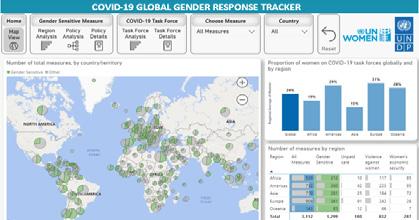
11 Regional Hub for Latin America and the Caribbean | Highlights 2020

02_
Responding to Country Demands: Integrated Solutions to advance the Sustainable Development Goals (SDGs)

The Latin American and Caribbean region has made tremendous strides in development in recent decades, but remains the least equitable in the world. Moreover, the satisfaction with the political system in Latin America reached an all-time low in 2018, with 3 in 4 people expressing a negative judgment about political life in their country.
To support countries in meeting the 2030 Agenda and the Sustainable Development Goals (SDGs) and achieve a multi-dimensional level of progress that extends beyond the economic benefits, the Regional Hub is supporting country offices with a variety of integrated solutions that bring together the range of skills needed to deliver a multidimensional stance (on a wide range of priority areas such as SDGs, Green Climate Fund, the private sector, governance, energy, innovation, etc.) and stren-
gthening integration and coordination between the policy function with the country support interface in New York. In 2020, the Hub’s support translated into 1451 technical egangements to assist Country Offices in various endevors (see Heat Maps throughout the report to see thematic breakdowns).
The Regional Hub is working to transform traditional development models and help countries increase the quality of life of their population while preserving and restoring biodiversity and protecting ecosystems. The latter is crucial in the case of Latin American and the Caribbean, considered a superpower in biodiversity, as it has one of the greatest legacies. Further complicating the Hub’s work is insuring that no one is left behind, which is both a crucial challenge as well as an opportunity for this region.
13 Regional Hub for Latin America and the Caribbean | Highlights 2020
A Vision for Latin America and the Caribbean: Our Pillars
The development for Latin America and the Caribbean is a three-lane road – productivity, inclusion, and resilience – with effective governance as the essential foundation. The present report reflects how we are working towards paving these three lanes to ease the journey of the 2030 Agenda in the region.
Effective governance at the core of sustainable recovery
TThe world ended 2020 with over 78 million cases and 1.8 million deaths by COVID-19. A disproportionate percentage of this suffering (20% of all cases and 30% of all deaths) came from the LAC region, which contains less than 9% of the world population. Compounding this impact in terms of human health and lives were the pandemic’s effect on the economic, social, and political spheres, where pre-existing conditions in the region that include low trust in institutions, political and social polarization, perception of State capture, and weak mechanisms of political representation, were further exacerbated.
Between September and November 2020, UNDP organized seven consultations with a variety of actors in the region based on the recognition that the COVID-19 pandemic was an unprecedented crisis that went well beyond a health emergency, and because of its systemic nature, should be understood as a crisis of governance.
It was concluded from these consultations that a new approach to development was now necessary, one that recognizes the need to search for innovative solutions and new political and social agreements that can guarantee economic prosperity, peace, and social cohesion while preserving the planet. Multilateral institutions are essential to usher in the construction of this new sustainable social contract.
14 Regional Hub for Latin America and the Caribbean | Highlights 2020
This new vision of effective governance also applies to climate and nature. We are partnering with countries in the region in strengthening environmental and climate change governance by improving national and local capacities to support sound environmental management and implement long-term climate change mitigation and adaptation strategies. In this context, we work with all levels of the Government as well as the private sector, civil society, and community-based organizations to address drivers of land-use change and to promote the sustainable management of natural resources. We also support the development of policy frameworks, sectorial plans, and decision-making processes to tackle the climate and nature crisis in the region, which includes support to energy transition and the transfer of technologies to phase out dangerous chemicals. Through the Climate Promise and the NDC Partnership Support Program, we support 25 countries in the region to increase their ambitions for climate action and enhance their capacities to achieve their Paris Agreement pledges through “whole of Government” and “whole of society” approaches.
The publication Latin America and the Caribbean: Effective
Governance, beyond Recovery, arises as a result of this regional consultations and it is available here.
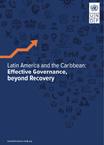
The new LAC governance narrative principles
The following eight principles, collected during the above-mentioned consultations, are proposed to promote discussion of national realities. They are by no means exhaustive, but serve as a starting point for the necessary conversation on sustainable recovery and are aimed at achieving the implementation of the 2030 Agenda in this decade.
Fiscal policies must allow for sustainable andinclusive spending,and are friendly to economic growth
Innovation will be used to transform the capacities of the State
Public management will be transparent, accountable, and with publicity available information
The reconstruction of trust and legitimacy in political, economic, and social actors is essential
Citizens are active participants in the construction of agreements
The use of violence as negotiation mechanism between social and political actors must be eliminated
The rule of law and access to justice is applied equally to all citizens
Intergenerational equity and environmental sustainability are priority objectives
+
Governance Pillar 1
Governance is the creation of conditions for social advancement through agreements between diverse social actors, and where the Government in its exercise of delegated authority must enjoy legitimacy and deliver results for all. The governance crisis being experienced due to the COVID-19 is the product of a systemic shock that has exposed the deficiencies of the health, education, and social protection systems. The pandemic is an opportunity to learn from these lessons and renew our will to build more productive, inclusive, and resilient societies.
Productivity Heatmap
Country offices received technical support 573 times from the Regional Hub, to help them provide innovative solutions to strengthen the governance in
0 1-9 10-19 20-29 30-39 40-50
Trinidad & Tobago (9)
Ecuador (19)
Guatemala (14)
El Salvador (40)
Costa Rica (24)
Panama (31)
Cuba (10)
Haiti (11)
Dominican Republic (45)
Guyana (11) Suriname (11)
Brazil (17)
Mexico (14)
Argentina (15)
Peru
Belize
Uruguay
Chile (14)
Paraguay (29) Bolivia (9)
(19) Colombia (31)
Jamaica
(6)
Nicaragua
(0)
Honduras
(27)
(5)
Venezuela
(18)
(13)
% Engagements with a Gender Focus Tobacco % Engagements with a COVID-19 focus 22% 18% 40% 51% 4% New Normal
Strengthening Capacities of Governments
Antigua and Barbuda (7)
Dominica (2)
St. Vincent & the Grenadines (1)
Grenada (1)
Region 463
Barbados (10)
region.
the
Gender Seal: Helping countries to close persistent gender gaps in their public sector

In 2020 and 2021, seven countries in the region (Chile, Colombia, Costa Rica, Paraguay, Panama, Peru, and the Dominican Republic) with over 40 institutions will have joined the Global Gender Equality Seal Program in public institutions. The Seal is an accelerator for gender mainstreaming in public policies for the achievement of SDGs 5 and 16. The initiative, which emerged in Latin America and the Caribbean, has become a global initiative of the UNDP.
In 2020, within the framework of the Seal of Gender Equality in Public Institutions, the virtual course “Keys to Gender Equality in Public Administration in the context of COVID-19” was held, in which 180 civil servants from 16 countries in Latin America and the Caribbean participated. Additionally, in 2020, the GEPA Report was launched, which monitors the presence of women in management positions in public administration.
18 Regional Hub for Latin America and the Caribbean | Highlights 2020
SIGOBito
2.0 -
Involving communities in the design of local policies
As never before, governments must rely on innovation, collaboration, and technology to respond to the demands of their citizens. The pandemic accelerated the demands and use of digital and analytical features in the daily work of government institutions and was an opportunity to add innovative elements to methodologies. According to this, the demands from governments for support to create comprehensive solutions and improve efficiency and transparency in public services increased significantly so it was a great opportunity for the SIGOB project to renew all its methodologies and instruments, strengthening the “analytics” approach and the interaction with citizens. During 2020, the Regional through the SIGOB project, supported more than 135 institutions from 20 countries in the region, resulting in more than 300 projects implemented and 650 systems installed. In addition, support to the UNDP offices was continued within the framework of the implementation of the Sustainable Development Goals platform and the Knowledge Products for Public Policies methodology.
If we focus on the local level, one of the most innovative methodologies was the SIGOBito 2.0. In 2020 the Regional Hub, through the SIGOBito methodology, contributed to strengthening the management capacities of local governments represen-
ting between 30,000-100,000 inhabitants in two countries in the region by identifying key actors, neighborhoods, and concepts linked to the management process and facilitating close and constructive dialogue with citizens. This new governance approach resulted in important jumps in institutional productivity, as it directed human, technical, financial, and political resources in priority places, and generated greater proximity and transparency with the community by having the problems exposed by those who suffer them.
Additionally, collaboration and sharing are imperative in decision-making spaces. In that regard, SIGOBito Community provides a virtual network of local governments that enables sharing information and providing municipalities with tools and collaborative practices to tackle common challenges, share good practices and learnings, and access specialists and experts from the United Nations around the thematic discussions that take place regularly.
Throughout 2020, the SIGOBito methodology was successfully implemented by local governments in Fontana, Argentina, and Hernandarias, Paraguay, which developed more than 2,220 initiatives through consultative dialogues and interactive processes in 107 neighborhoods.

SIGOBito supports collaborative networks among municipalities that work towards local and sustainable development.
19 Regional Hub for Latin America and the Caribbean | Highlights 2020
Inclusive Leadership: Democratic parity in Latin America and the Caribbean

In 2020, the inter-agency initiative ATENEA- Democracy Parity, which was jointly led by UNDP, UN Women, and IDEA International was implemented in five countries: Paraguay, Brazil, Mexico, El Salvador, and Peru. In addition, UNDP supported the methodological transfer of ATENEA’s parity index to the Electoral Tribunal of Panama. An important recent milestone was also reached during the year: the creation of a virtual platform for women in politics (FLACSO-ATENEA), which had 5,000 women leaders registered, of which 800 were selected for the courses. ATENEA also launched its study
“Surcando Olas Y Contra-Olas Una Mirada Paritaria A Los Derechos Políticos De Las Mujeres En América Latina”. In 2020, and developed a Roadmap on “Violence Against Women in Politics: Roadmap to Prevent, Monitor, Punish and Eradicate it,” a tool to address violence against women in the political sphere in all branches and levels of government.
20 Regional Hub for Latin America and the Caribbean | Highlights 2020
Caribbean Justice: ensuring equal access to justice for all by 2030
Inequality, discrimination, and exclusion remain severe obstacles to universal sustainable development, and the COVID-19 pandemic has exacerbated these issues, especially among people living in poverty and marginalized groups. Moreover, sexual and gender-based violence has devastating, long-term effects on the lives of victims, their families, and communities, and impedes development progress.
To identify new challenges and strengthen the effectiveness and efficiency of the justice chain in a radically shifted social context, the UNDP Regional Hub conducted an extensive needs assessment in 2020 in nine Caribbean countries: Antigua and Barbuda, Barbados, Belize, Dominica, Guyana, Grenada, Saint Kitts, and Nevis, Saint Lucia, and Trinidad and Tobago. This analysis identified trends across the subregion to determine how the international community can add value to current efforts and initiatives on improving access to justice and its administration. A salient feature identified in the assessment was the lack

of available data for the design of regional and national assessments and result-oriented solutions, which was compounded by a backlog of cases.
As a result of this exercise, a UNDP Needs Assessment Report (NAR) was published that establishes specific guidelines to move the Caribbean region from a less punitive system to a more rehabilitative one. The document also includes findings and recommendations at both the regional and national levels to ensure no one is left behind in the recovery process.
At the end of 2019, the CariSECURE Project also launched the implementation of the Crime Victimization Survey (CVS) in Saint Lucia, a key tool to support this process across priority countries, asit allows for accurately ascertaining the magnitude of victimization within a country by measuring crime levels and trends, perceptions of public safety, the impact of crime on society and vulnerable groups, and the level of public confidence in the criminal justice system and its actors.
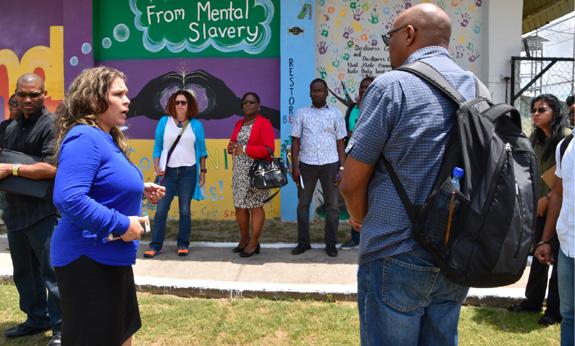
21 Regional Hub for Latin America and the Caribbean | Highlights 2020
the
nine countries here. +
You can see the publication Caribbean Justice: a needs assessment of
judicial system in
Empowering the Judicial System to respond to gender-based violence

With the COVID-19 crisis, we must work together more than ever to create a new normal that is more inclusive, equal, and that leaves no one behind.
The Regional Hub, together with the Judicial Education Institute of Trinidad and Tobago (JEITT) and the OECS Judicial Education Institute (OECS -JEI), annually convenes the Judges Forum on HIV, Human Rights, and the Law. The Forum provided 39 judges and magistrates with the opportunity to review the critical role of the criminal justice response to gender-based violence and to ensure that relevant criminal laws are interpreted through the lens of international standards and norms.
These annual meetings, supported by the UNDP, are also an opportunity for members of the judiciary in the Caribbean to reflect on HIV, TB, human rights, and the law as well as support the professional development of a new generation of judicial leaders familiar with these issues.
Through its continued support, UNDP increased the capacity of the justice sector to reduce secondary victimization by advocating that addressing violence and its outcomes remains a key component to the response to HIV.
22 Regional Hub for Latin America and the Caribbean | Highlights 2020
Partnership
Joining efforts for Improved Evidence-Based Policies on Criminal Justice

The three major challenges facing penitentiary systems in the region before the pandemic were high incarceration rates, with an estimated 1.5 million people deprived of liberty; severe overcrowding in prisons, with 64% of prisons being overcrowded, one of the highest averages in the world; and procedural delays1. This already dangerous scenario was compounded by new challenges arising from the pandemic such as the lack of access to potable water and the impossibility of physical distancing in overcrowded detention centers — resulting in a direct impact on the health and safety of those deprived of their liberty.
To address these challenges, the UNDP in partnership with the Association for the Prevention of Torture (APT) established a strategic alliance to create the COVID-19 Digital Mapping: Justice and Deprivation of Liberty. This online tool documented the responses adopted by 31 countries in Latin America and the Caribbean to confront the challenges generated by COVID-19 to detention centers. Through this innovative process, the Regional Hub was able to provide up-to-date data that can better guide evidence-based policies, transforming justice and security institutions with a human rights-based approach.
The Digital Mapping tool contributes to show different initiatives and measures that governments in the region have taken and continue to take and promotes dialogue, information sharing, and elements for action.
23 Regional Hub for Latin America and the Caribbean | Highlights 2020
Partnership
1. “Penitentiary Systems and the COVID-19 Emergency”, UNDP 2020.
Strengthening human mobility programmes in the region
The landscape of human mobility in Latin America and the Caribbean has changed rapidly over the last decade. Although the region has traditionally been characterized by high levels of migratory flows (especially to the United States), several countries are now receiving a growing number of immigrants from other countries in the region and the situation in Venezuela is symptomatic of these new trends. Additionally, the drop in remittances induced by the crisis of COVID-19 has created negative repercussions for recipient households and their communities.
In response, the Regional Hub developed its Regional Strategy on Human Mobility and Sustainable Development in Latin America and the Caribbean, in 2020. This strategy is based on the principle that human mobility represents an opportunity not only for people on the move, but also for their countries of origin, transit, and destination.
The new regional strategy identifies the main areas of intervention for both the

region’s country offices and the Regional Hub in terms of international migration and forced displacement. It establishes key priorities for addressing the challenges that arise from human mobility and asserts that migrants, including refugees and asylum seekers, have access to rights, protection, and services that will help them overcome the specific risks and vulnerabilities they face.
Due to the COVID-19 pandemic, the situation of women and girls in the context of human mobility has worsened. In the framework of the Coordination Platform for Refugees and Migrants from Venezuela (R4V), UNDP also launched the study “Reinventarse sobre la marcha: Mujeres refugiadas y migrantes de Venezuela. Un estudio de sus condiciones y accesos a medios de vida en Colombia, Ecuador y Perú.” This document showcased extensive research on female migration from Venezuela to understand the kinds of livelihoods that women in situations of human displacement have access to in transit and destination countries — and the role that gender violence plays in this process. The study also presented an evaluation of the availability of sex-disaggregated data on migration processes in the three countries that were the focus of the research (Colombia, Ecuador, and Peru) that make up the route through which most migrants from Venezuela pass.
UNDP plays a key role in this context together with other UN agencies and national and local authorities, who directly face the challenges that arise from human mobility.

24 Regional Hub for Latin America and the Caribbean | Highlights 2020
Partnership
The Publication Regional Strategy on Human Mobility and Sustainable Development in Latin America and the Caribbean: +
Enhancing Citizen Security mechanisms in the region
The homicide rate in Central America (and the Dominican Republic) in 2020 was 18.8 per 100 thousand people. This represented a loss of 9,025 lives to murder in the subregion in only a year’s time. A review by by country over the same period reveals that five out of six registered homicide rates were still above the threshold considered epidemic by the World Health Organization2. One of the main factors that explains this phenomenon is the short-term effect of social distancing measures to contain the COVID-19 pandemic, which were stricter in several Central American countries.
Against this background, the Regional Hub continued to encourage institutions to advance towards an open data and evidence policy in matters of citizen security. The Infosegura project reinforced an analysis performed with greater levels of disaggregation, territorialization, and georeferencing by supporting countries in key initiatives like such as The Integrated Information System for Policies of Coexistence and Citizen Security in Honduras, the Institutional Web Portals with advanced analyzers in Honduras and Guatemala, the Integrated Information System for Violence Prevention in Guatemala, and the Police Missing Persons Portal in El Salvador.
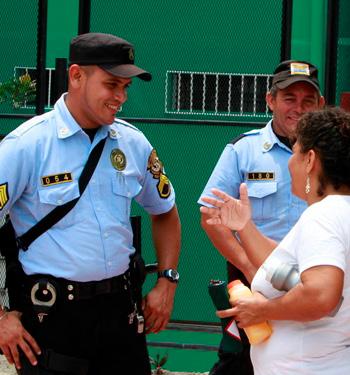
Also based on evidence compiled in the 2020 Infosegura quarterly analysis, the Regional Hub developed a regional awareness and prevention campaign on violence against women that waslaunched in five countries in the region (Costa Rica, the Dominican Republic, El Salvador, Guatemala, and Honduras). Under the slogan “No society will be safe until women are safe”, the campaign aimed to show the escalation of aggressions against women within quarantined homes during the Pandemic by identifying conjunctural causes, sensitizing populations, and promoting state responses to prevent and report.
Additionally, the SDG16+ community of practice (Infosegura) helped information sources strengthen their technical capacities, information management techniques, and tools to compile indicators on Sustainable Development Goal 16 in Honduras, which includes indicators such as violent death, femicide, sexual violence, and south-south & Knowledge Exchanges.
A community of practice on evidence-based policy was also set in Honduras, with Datacción, as the Infosegura’s weekly webinar (23 webinar between March 2020 and December 2020), with audience from 24 countries,
25 Regional Hub for Latin America and the Caribbean | Highlights 2020
Project
2. Belize, Costa Rica, El Salvador, Guatemala and Honduras had homicides rates that were greater than 10 per 100,000 inhabitants.
Mitigating and preventing violence against women and girls (VAWG) in the region
Spotlight Initiative in Latin America: Eradicating femicide/ feminicide
The UNDP, together with UN Women and UNFPA, are implementing the Latin America Regional Programme of the Spotlight Initiative, a global, multi-year partnership between the European Union and the United Nations to eliminate all forms of violence against women and girls (including femicide/feminicide) by 2030. In addition to the regional component, the initiative is also being implemented in five countries (Argentina, Ecuador, El Salvador, Honduras, and Mexico).
The regional Hub, together with the support of partner agencies (ECLAC, IOM, UNODC) and regional mechanisms (SICA-COMMCA, MESECVI), conducted eight multidimensional studies on femicide/feminicide in the contexts of high social vulnerability characterized by the presence of organized crime, forced disappearances of women and girls, human trafficking, contexts of human mobility, multidimensional poverty or chronic violence, among others. These studies will be finalized and launched in 2021. UNDP also partnered with ECLAC to strengthen the ECLAC Gender Equality Observatory’s femicide indicator.
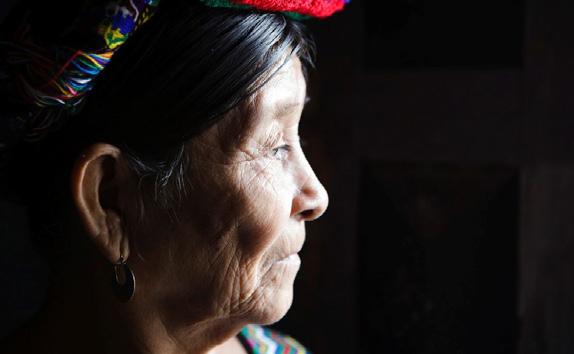
In 2020, a strategic alliance was also forged with the UNDP’s Gender Equality Seal for the Private Sector initiative to promote gender equality and women’s empowerment and to create the Strengthening Program - Violence against Women in Private Companies (GES-VCM), which aims to promote the co-responsibility of the private sector together with states and civil society in the prevention and referral of cases of violence against women, which were exacerbated during the COVID-19 pandemic.
26 Regional Hub for Latin America and the Caribbean | Highlights 2020
Project
Project
Mitigating and preventing violence against women and girls (VAWG) in the region
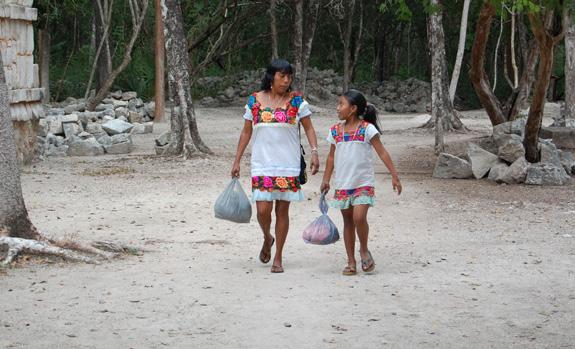
Spotlight Initiative in the Caribbean: Eradicating domestic violence
In the Caribbean, UNDP, together with UN Women, UNFPA, and UNICEF, is implementing the Caribbean Regional Programme of the Spotlight Initiative, whose focus is on the eradication of domestic violence. UNDP is working with CARICOM and its subsidiary bodies to strengthen the justice and security sector and to integrate a gender perspective and the prevention of gender-based violence into the institutional response to natural disasters. In this
region, UNDP is also conducting a study to measure the impact of domestic violence on the LGBTI population and designing a strategy to optimize the production and visibility of data on domestic violence in the region, among other actions. In addition to the regional component, the initiative is being implemented in six countries where UNDP serves as a co-leader (Belize, Guyana, Jamaica, Haiti, Grenada, and Trinidad and Tobago).
27 Regional Hub for Latin America and the Caribbean | Highlights 2020
Project
Mitigating and preventing violence against women and girls (VAWG) in the region
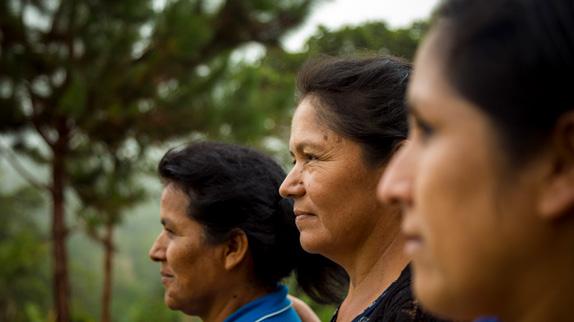
UNDP-CAF Project: State’s response to violence
The project “Desarrollo de capacidades estatales para prevenir y responder a la violencia contra las mujeres y las niñas (Argentina, Ecuador y Perú)” began in December 2018 and was extended until December 2020. The project was framed in a strategic partnership between the Regional Center for Latin America of the United Nations Development Program (UNDP) and the Development bank of Latin America (CAF). Its objective is to improve states’ responses to VAWG in the areas of prevention, care, and reparation. It takes into
account the cases of Argentina, Ecuador, and Peru, and includesa regional component that develops two public goods scalable to the region: a comprehensive framework for the prevention, care and reparation of VAWG and a methodology and cost estimation tool for policies aimed at eliminating VAWG. The project improved the capacities of governments to promote the development of policies that provide a comprehensive response to VAWG and the development of a CAF intervention strategy for the eradication of VAWG to meet the needs and demands of the region’s governments in this area.
28 Regional Hub for Latin America and the Caribbean | Highlights 2020
Project
Mitigating and preventing violence against women and girls (VAWG) in the region

JUSTA Project: The Cost of Violence
This project aims to plan, cost, and implement local action plans to address VAWG within the framework of UNDP’s global program “Ending Gender-Based Violence and Achieving the Sustainable Development Goals”. The project is supported by the Government of Korea, and Peru was one of seven countries around the world that were selected for participation. The Project is being implemented in a local government south of Lima called Villa El Salvador.
The “Villa El Salvador for Justice and Equality” Justa Project is supported by the Ministry of Women and Vulnerable Populations as the governing body, and by different stakeholders from the public sector, civil society, the private sector, and the community in general. The project has contributed to the design, costing, and implementation of a participatory local plan for the response to violence against women.
29 Regional Hub for Latin America and the Caribbean | Highlights 2020
Productivity Pillar 2
Productivity in Latin America and the Caribbean has stagnated in comparison to that of developed economies. As the region is not growing despite making significant investments in human resources and infrastructure development, the regional hub is working to strengthen countries’ capacities to take better advantage of gains while avoiding the misallocation of productive factors.
30 Regional Hub for Latin America and the Caribbean | Highlights 2020
Productivity Heatmap
Country offices received technical support on 196 diferent occations from the Regional Hub to help them provide innovative solutions to their government for boosting productivity.
Strengthening Capacities of Governments
% Engagements with a COVID-19 focus
% Engagements with a Gender Focus
31 Regional Hub for Latin America and the Caribbean | Highlights 2020 0 1-9 10-19 20-29 30-39 40-50
Trinidad & Tobago (9)
Ecuador (19)
Guatemala (14)
El Salvador (40)
Costa Rica (24)
Panama (31)
Cuba (10)
Haiti (11)
Dominican Republic (45)
Guyana (11) Suriname (11)
Brazil (17)
Mexico (14)
Argentina (15)
Paraguay (29) Bolivia (9)
Peru
(19)
Colombia (31)
Jamaica(6) Nicaragua (0) Honduras(27) Belize (5)
Chile
Venezuela (18) Uruguay (13)
(14)
Tobacco
22% 18% 40% 51% 4% New
Normal
Antigua and Barbuda (7)
Dominica (2)
St. Vincent & the Grenadines (1)
Grenada (1)
Region 463
Barbados (10)
Empowering Micro, Small and Medium-sized Enterprises (MSMEs) to adapt their business to the new normal
In 2020, UNDP supported eight countries with methodologies for Small and Medium Enterprises within the SDG Value Chains programme under two modalities: the Supplier Development Programme through exchanges between Ecuador and Albania, and the Digital In Motion (known as “En Marcha Digital) toolkit received by Barbados, Colombia, the Dominican Republic, Guatemala, Mexico, Peru, and Venezuela. In addition, the pilot of a social inclusion methodology in the Dominican Republic (“Adaptando Tu Negocio”) was designed for later scalability.
The Regional Hub, through its Inclusive Growth and SDG Integration Team, contributed to the UNDP’s Signature Solutions approach through initiatives such as the In Motion program, which created added value for countries from a ”benchmarking effect” of setting positive private sector references for integrating the SDGs in value chains.
Throughout 2020, the UNDP continued to support national efforts to the consolidation of the Gender Equality Seal for the private sector in partnership with government institutions in Latin America and Africa as a means to bridge gender gaps and promote women’s empowerment in the business

sector. The Gender Seal remains active in eleven LAC countries, and efforts have been made for a customized programme in Guatemala, Peru, and Argentina that does not include certification or government support. Also, efforts to support the adoption of a new national standard in El Salvador were made supporting the Ministry of Economy and the National Institute of Quality.
During the year, the UNDP also developed the paper, “The Coronavirus and the challenges for women’s work in Latin America”, a tracker of business actions with social and gender impact that fosters the involvement of the private sector in the COVID recovery and a set of surveys to assess impacts on SMEs, Women-Owned Businesses, and employee well-being.
32 Regional Hub for Latin America and the Caribbean | Highlights 2020
Assisting countries in their transition to a sustainable energy future
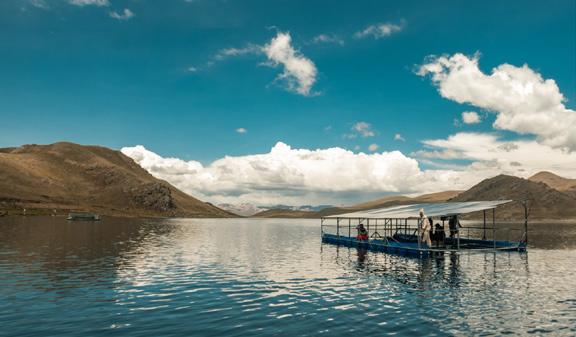
It is estimated that by 2040, region-wide primary energy demand will reach over 1,539 tons of oil equivalent —at least 80% higher than present-day levels. Without significant improvements to energy production infrastructure, it will become progressively more difficult to provide the basic goods and services that ensure the well-being of current and future generations. The COVID-19 pandemic provided large-scale evidence of how critical energy access is to people’s livelihoods.
In this regard, the Regional Hub assisted Mexico, Uruguay, Paraguay, Brazil, Peru,
Colombia, and Trinidad and Tobago to develop action plans towards building greener and healthier cities.
Promoting the use of clean energy in efficient ways is a critical objective Of the UNDP’s fight against climate change. With the organization’s support, countries are committing more firmly to using renewable sources of energy.
33 Regional Hub for Latin America and the Caribbean | Highlights 2020
Unleashing Climate Action in the Caribbean

High energy costs and fossil fuel dependency contribute to the decrease in Caribbean competitiveness and its potential growth while ocean acidification, rising sea levels, tropical cyclones, and temperature changes are expected to negatively impact coastal livelihoods, tourism, health, and food and water security in islands nations.
To counter this, the UNDP and the Caribbean Development Bank (CDB) are working jointly in the sub-region to develop the Programme “Transforming Finance to Unlock Climate Action in the Caribbean”, which will seek to mobilize co-financing
from the Green Climate Fund (GCF). A grant from the project preparation facility from the GCF has been approved to support the design phase of this programme.
This initiative aims to enhance climate resilience and reduce and avoid greenhouse gas (GHG) emissions in three Caribbean countries (Belize, Jamaica, and Saint Lucia) by unlocking private sector investment needed to transform Caribbean productive sectors and energy systems, and catalyzing the transformation of finance.
34 Regional Hub for Latin America and the Caribbean | Highlights 2020
Partnership
Partnering for action towards green economy (PLV– PAGE)

The Partnership for Action on Green Economy (PAGE), launched in 2013 as a response to the call at Rio+20, seeks to put sustainability at the heart of economic policies and practices to advance the 2030 Agenda for Sustainable Development, and supports nations and regions in reframing economic policies and practices around sustainability to foster economic growth, create income and jobs, reduce poverty and inequality, and strengthen the ecological foundations of their economies.
During the 2020 LAC Sustainability Week, the Latin American Green Awards (known as PLV by its Spanish acronym) were celebrated with PAGE as a key partner for the awards, highlighting the role of a green economy in the region as a key component for achieving environmental protection and prosperity. The PLV engaged in 2,545 projects from 25 countries and 562 cities. Green business acceleration strategies were extended with 209 completed projects.
35 Regional Hub for Latin America and the Caribbean | Highlights 2020
Partnership
Making the case for Tobacco Control
Smoking prevalence in the region has decreased in the last decades due to regional tobacco control efforts. However, despite the achievements in tobacco regulations, nearly 70 million smokers in Latin America are at risk of tobacco-related deaths and diseases3. The overall annual cost of health care attributed to tobacco use in LAC has been estimated at between 6% and 15% of total healthcare costs4
More than 80% of the world’s smokers live in low- and middle-income countries5, and the costs of tobacco use in these societies can be seen in increased healthcare costs, high productivity costs to the economy due to illness and early death, and impacts on the environment.
The Regional Hub, jointly with WHO/PAHO, the Framework Convention on Tobacco Control Secretariat, and the Research Triangle Institute partnered with countries such as El Salvador, Colombia, Suriname, and Costa Rica to develop investment cases on tobacco control and roadmaps for national coordinating mechanisms. The
3.
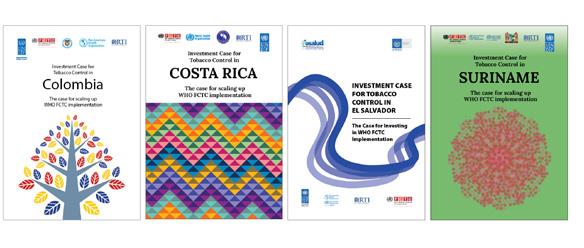
Hub provided return-on-investment evidence for countries to reduce tobacco consumption and the burden of tobacco attributable non-communicable diseases.
The UNDP worked with a broad range of government policymakers in the region to make tobacco control a win-win for development and for building forward better.
5. WHO Report on the Global Tobacco Epidemic, 2019: The MPOWER package. Geneva: World Health Organization; 2019.
36 Regional Hub for Latin America and the Caribbean | Highlights 2020
Tobacco Atlas, Tobacco use in Latin America, November 2018, 4. Prabhat Jha, Chaloupka FJ. Curbing the epidemic: Governments and the economics of tobacco control. Washington, D.C, World Bank, 1999
Guiding countries in the phasing out of Mercury
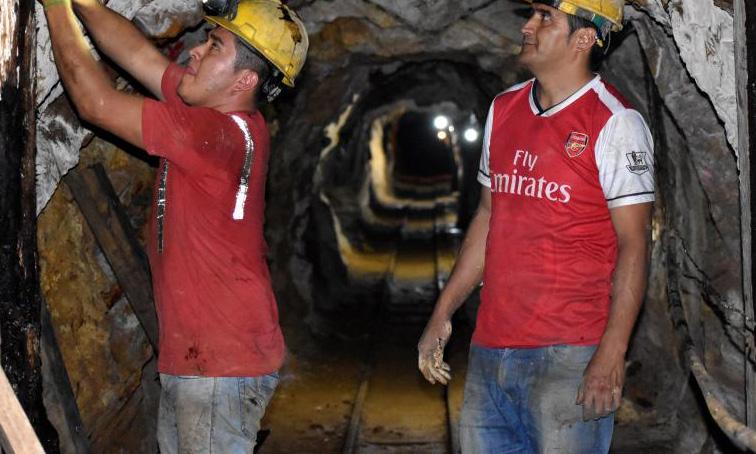
Mercury is extremely harmful due to its impact on the environment and because of its effects on human health.
To mitigate the effects of mercury, the Hub supported Colombia and Peru in making advances in their obligations under the Minamata Convention through the GEF GOLD programme to phase out the use of mercury and reduce its emission from artisanal and small-scale gold mining, reduce harmful risks to peoples’ health and the environment, and create sustainable livelihood opportunities.
As a result, these countries were able to introduce and adopt sustainable production technologies and develop sustainable supply chains, promote best practices and techniques for gold extraction, and share knowledge with countries beyond the region. In addition, the critical role that women play in this sector was analyzed.
37 Regional Hub for Latin America and the Caribbean | Highlights 2020
58 Regional Hub for Latin America and the Caribbean | Highlights 2020 0 1-9 10-19 20-29 30-39 40-49 50-59 60-69 70-79 80-89 90-100
Trinidad & Tobago (26)
Ecuador (90)
Guatemala (46)
El Salvador (85)
Costa Rica (95)
Panama (69)
Cuba (30) Haiti (34) Dominican Republic (96)
Guyana (30) Suriname (40)
Brazil (66)
Mexico (64)
Argentina (43)
Paraguay (74)
Bolivia (30)
Peru (89)
Colombia (88)
Jamaica (29)
Nicaragua (4)
Honduras(95)
Belize (35)
Venezuela (27)
Uruguay (39v)
Total
% Engagements with a Gender Focus Region 1451 % Engagements with a COVID-19 focus 19% 12%
Chile (41)
Engagements Heatmap
Antigua and Barbuda (16)
Dominica (11)
St. Vincent & the Grenadines (14)
Grenada (10)
Barbados (35)
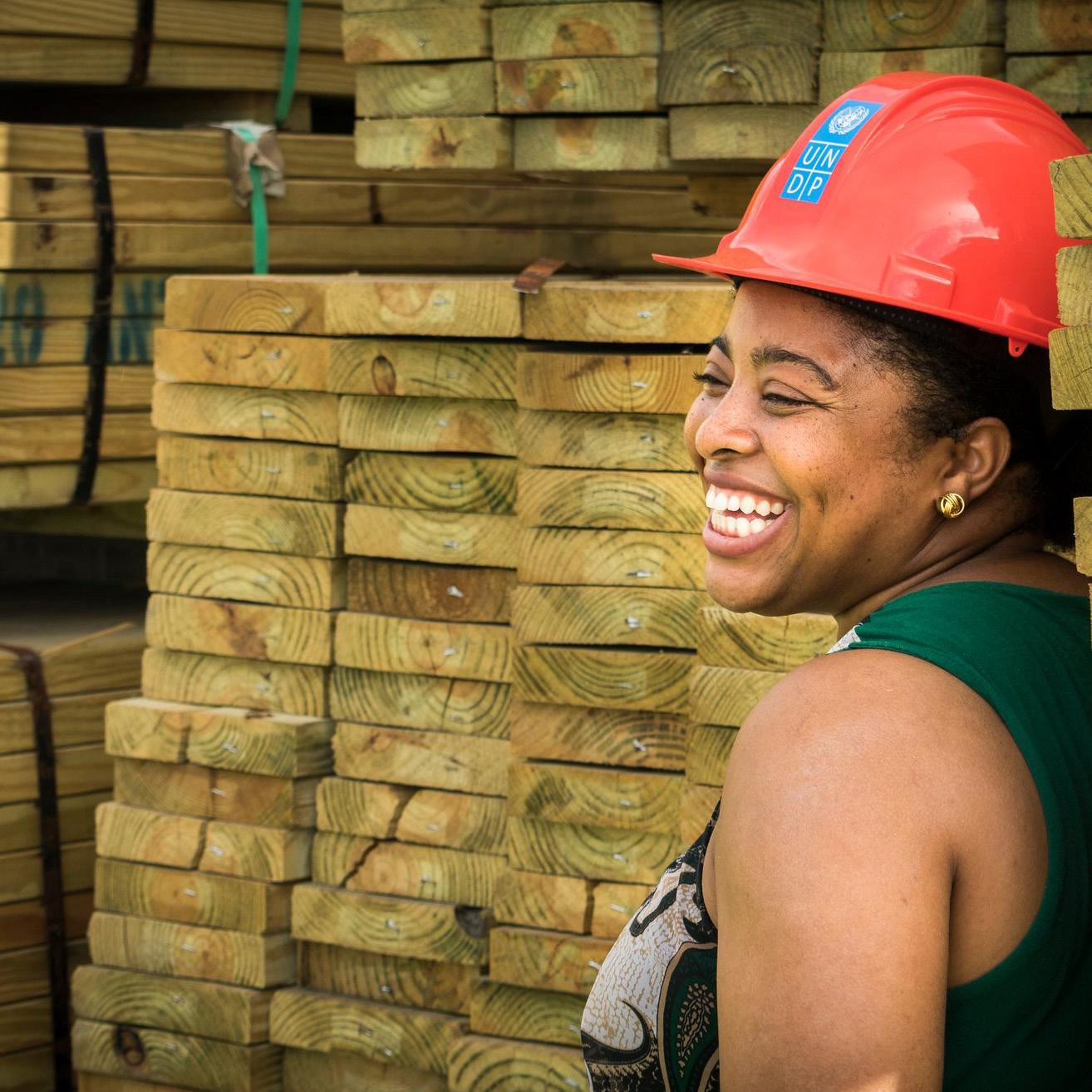
03_
Impeccable Administration

The UNDP in Latin America and the Caribbean has been working to position itself as an increasingly effective instrument for governments in their efforts towards achieving sustainable development. To do this, it is essential to accomplish impeccable administration of our programmes and operational processes by developing new mechanisms and tools that enhance our work as well as emphasize efficiency, accountability, integrity, and transparency in processes.
Following the above-mentioned objective, the Regional Hub Business Solutions
and Operations (BSO) unit began in 2020 a rigorous process to transform its business model, with the aim of providing agile, effective solutions tailored to the complexity of the demands that come primarily from Country Offices of the region, as well as from Central Bureaux and other UN Agencies, Funds and Programs (AFP). This change in the business model and consequent repositioning of the Regional Hub led to the strengthening of the advisory and training functions, as well as the development and adoption of new tools that can be replicated in other COs.
60 Regional Hub for Latin America and the Caribbean | Highlights 2020
Standardizing processes and apprising operating procedures to support UNDP COs and other UN Agencies
Within the direct support to COs that the BSO unit provided, we conducted training on procurement policies and procedures, not only to the Regional Hub staff, but also to COs such as Nicaragua and regional projects like SIGOB or Infosegura, as well as technical support in the execution of procurement processes to the Trinidad and Tobago and Honduras COs. In the latter case, the procurement team supported the office to carry out a complex process of acquiring the services of a financial entity for the implementation of the “Unique Bonus”, an innovative social protection programme launched by the Honduran Government, to supporting the most vulnerable population affected by COVID-19. The Unique Bonus is a one-time subsidy of $ 82 dollars (2,000 lempiras) delivered through an electronic voucher that can be exchanged for food, medicine and / or medical supplies to up to 260,000 people in the country.
The human resources unit carried out eight (8) recruitment processes for the Office of the Resident Coordinator in Belize, in addition to providing advice on specific inquiries. Likewise, the Compliance Review Panel (CRP) of the Regional Hub conducted a review of twenty-five (25) selection processes carried out by various
COs. More specifically, support was provided to the UNDP Paraguay and UNDP Mexico offices to finalize their optimization processes.
On the other hand, BSO contributed directly to the implementation of the first phase of the project to launch the Regional Human Development Report by hiring Study Centers, Polling Entities and Individual Consultants who provided technical advice on data collection, statistics, programmatic issues. and other essential knowledge for the preparation of the Report.
During 2020, The Regional Hub through the BSO Unit, continued to reinforce the services offered to other UN agencies. Procurement, finance and administration units provided support to UNDCO and UNV Regional Offices for LAC, through the acquisition of goods and services, and the hiring of individual consultants as well as the processing of payments and requests from the Ministry of Foreign Affairs. UNODC also continued to be supported in the selection processes for its staff. Likewise, the ICT Unit provided technological and computer support to other UN agencies based in Panama such as UNRCO, UNDSS, UNV, UNWOMEN, OHCHR and UNDCO.
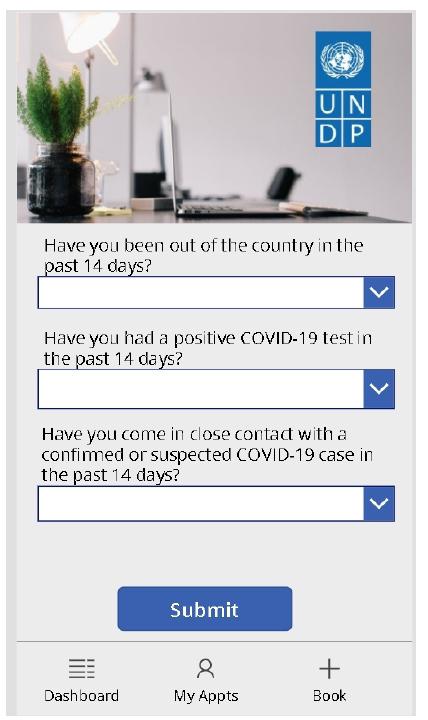
61 Regional Hub for Latin America and the Caribbean | Highlights 2020
Partnership
Expedited crisis response procurement processes with local added value
As the COVID-19 pandemic spread worldwide, the Regional Hub conducted the first procurement and distribution exercise in the region that was in connection to UNDP´s COVID-19 crisis response and based on regionally manufactured goods. Through this procurement activity, 275,000 surgical masks, manufactured in Colombia, were delivered in May to meet the needs of five UNDP country offices (Cuba, Haiti, Guatemala, Barbados and the Eastern Caribbean, and Suriname).
This decision contributed to accelerated delivery times and substantively reduced transportations costs along with the subsequent reduction of CO₂ emissions estimated in at least 5 tons of CO₂ when compared to purchasing from China. The process also contributed to the regional economic recovery by awarding an order of US$ 200,000 USD for the procurement of locally made goods. As part of the endeavor, the Regional Hub was able to secure a quality assurance endorsement by the time the masks arrived at the Colon free zone in Panama, guaranteeing distribution across the region within a remarkable timeframe of only three weeks, and preventing the product from being re-allocated by the supplier to a buyer other than UNDP.
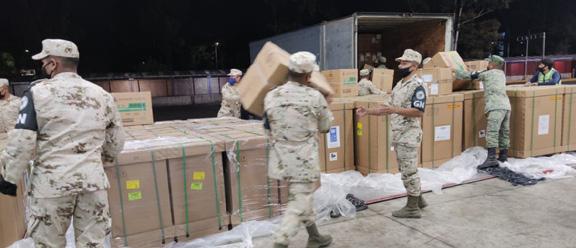
Additionally, at the height of the pandemic, when medical supplies such as the N95 masks were out of stock, and cases were worryingly increasing in the country, the Regional Hub delivered 3,000 N95 masks, purchased with the Crisis Bureau´s funds and stored at the United Nations Humanitarian Response Depot (UNHRD), to the Government of Panama for the use of the medical workforce in public hospitals.
All UNDP prepositioned items at the UNDHDR are available to country offices in the region under request to the Regional Hub.
Altogether, these supplies reached almost 13,000 people across all six countries, helping to curb the devastating effects of the pandemic.
62 Regional Hub for Latin America and the Caribbean | Highlights 2020
Supporting digitalization processes to increasing effectiveness
As part of regional efforts to promote digitalization and the sustainable use of resources, in January 2020 the Regional Hub officially began implementing Docusign and Vidcruiter, becoming the first business unit in Latin America and the Caribbean to incorporate both tools into daily processes. When in March 2020 the COVID-19 pandemic hit Panama, teams at the Regional Hub were already trained in the use of the tool, allowing for quick and effective responses to all operational requests, despite the increase in demand for services and the challenges of remote work. In that regard, we were able to transfer our expertise by facilitating a set of virtual training sessions at the national, regional, and global levels when Docusign was officially implemented by UNDP globally.
The pandemic also presented new challenges that forced the BSO team to review and automate many of the existing processes and develop new ones, such as the preparation and signing of Service Plans with the COs, the request and approval of petitions. teleworking, entry and exit of new staff to the Regional Hub, etc. Additionally, and as part of this digitalization process, many documents related to the previous administration, procurement, and human resources were digitalized

and stored in the cloud, allowing better monitoring and contributing to corporate sustainability efforts.
The Regional Hub, through its ICT Team, also supported the National Assembly in Honduras on its digitalization process during the pandemic, allowing the institution to establish a video-call stable system for all its employees.
It is also worth mentioning the development of an innovative mobile phone “app” for booking office spaces and meeting rooms at the new Regional Hub building, in line with all health protocols and measures imposed by COVID-19, to guarantee our staff health.
63 Regional Hub for Latin America and the Caribbean | Highlights 2020
Partnership
Greening the Regional Hub
The Regional Hub reinforced in 2020 its commitment to become a greener and more sustainable business unit and fully participate in the “Greening Moonshot” launched by the Administrator in September 2019. In this regard, apart from the use of DocuSign and other digital tools, which considerably reduced the use of paper, the Hub implemented a more sustainable and green contracting, where the environmental impact and the health of the users were the principles that guide such renewal. Consequently, the replacement of the vehicles by two hybrid cars that contribute to reducing the emission of polluting gases. Similarly, a company was hired to remove and clean unusable materials, mostly stored in the attic, and a waste disposal and processing service was put in place, resulting in a total of 35 tons of waste recycled and disposed responsibly.
Committed
to the well-being of our staff
Within the context of the pandemic, the Regional Hub focused many of its efforts on the well-being of its staff, in accordance with the “People for 2030” strategy. More specifically, in May 2020, a survey on staff well-being during the COVID-19 emergency was carried out, which made it possible to map the needs of employees and their families, and develop activities adapted according to the results. In that regard, the UNDP Regional Hub, in coordination with UNICEF, the Office of the Ombudsman, UNDSS, and other key partners, organized well-being sessions throughout the year that addressed several of the issues that were identified in the survey results, such as care of children and the elderly during the pandemic, domestic violence in the context of confinement, and crisis prevention and management both at home and in a working environment. Additionally, weekly breathing and relaxation sessions were organized and relevant information to prevent stress and burn-out was regularly shared.

64 Regional Hub for Latin America and the Caribbean | Highlights 2020

Our knowledge products in number
04_
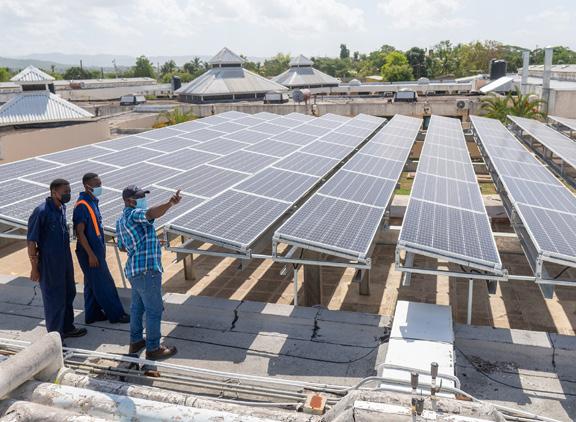
UNDP ranks among the top information providers in the development world and is recognized as a thought leader. Government officials, policymakers, and academia consult UNDP’s knowledge products for insights, data, and evidence on global development policy trends and ideas.
During 2020, the Regional Hub produced 510 knowledge products in a variety of areas such as Health and Development, Disaster Risk Reduction, Governance, Gender, Nature, Climate, Energy, Inclusive Growth, Peace, Human Development,
Sustainable Development Goals, among others – helping UNDP keep its thought leadership role in the region and beyond.
66 Regional Hub for Latin America and the Caribbean | Highlights 2020
KM Products by Thematic Area
Disaster Risk Reduction
It refers to theKMproductsg enerated throug hthe foll owi ng regi na lprojects: INFO RM in CA;Early Wa rningSys tems in theC ari bbean Ia nd II; andIrma& Ma ri aPos tHurri ca ne Recovery
Heal th andDevel opment
Inculdes KM products genera tedthrough thereg iona lproject "Bei ng LGTBIi nthe Ca ri bbea n"
Gender
It incl udesKMproductsg enerated throug hthe regi onal projects ATENEA,Spotlig ht,C AF-Prevention of
Envi ronment, Energy,C C
It
Governance &Sus tPea ce Includes KM products generated mainly through the regional projects SIGOB and Infosegura in Central America
Incl us iveGrowth, SDG, HDR
Inculdes KM products genera tedthrough the regi onal project"BeingLGTBI in the Ca ri bbea n"
67 Regional Hub for Latin America and the Caribbean | Highlights 2020 Tota
Knowl edge Ma na gement Produc ts 100%(510 ) KM Produc ts wi th aGenderFoc us (GF) 35% KM Produc ts wi th aC OVID-19Foc us (C-19F) 10%
l
incl
products genera ted
regi onal projectJCCCP
udes KM
throug hthe
Vi ol ence in womena nd gi rl s
7% (38) 9% (44) 7% (34) 20% (103) 26% (131) 31% (160) Resilience In 9%GF 20% GF 0%C-19 12% C-19F 100% GF 16% C-19F 0% C-19F 5% GF 15% C-19F 9% GF 16% C-19F 11% GF Tota l Knowl edge Ma na gement Products 100%(510 ) KM Products wi th aGenderFocus (GF) 35% KM Products wi th aC OVID-19Focus (C-19F) 10% Heal th andDevel opment Inculdes KM products generatedthrough thereg ionalproject "Being LGTBIinthe Caribbean" Disaster Risk Reduction It refers to theKMproductsg enerated throug hthe following reginalprojects: INFO RM in CA;Early WarningSys tems in theC ar bbean Iand II; andIrma& MariaPos tHurricane Recovery Incl us iveGrowth, SDG, HDR Inculdes KM products generatedthrough the regional project"BeingLGTBI in the Caribbean" Envi ronment, Energy,C C It includes KM products generated throug hthe regional projectJCCCP Gender It includesKMproductsg enerated throug hthe regional projects ATENEA,Spotlig ht,C AF-Prevention of Violence in womenand girls Governance &Sus tPea ce Includes KM products generated mainly through the regional projects SIGOB and Infosegura in Central America 7% (38) 9% (44) 7% (34) 20% (103) 26% (131) 31% (160) Resilience Pro Incl us ion 9%GF 20% GF 57% 0%C-19 12% C-19F 100% GF 16% C-19F 0% C-19F 5% GF 15% C-19F 9% GF 16% C-19F 11% GF 16%
Knowledge Products by Pillar
68 Regional Hub for Latin America and the Caribbean | Highlights 2020 Resilience 44% (226) Produc ti vi ty Incl us ion 26% (135) E ec ti ve Governance 57% GF 39% GF 10% GF 43% GF 11% (56) 16% (81) KM product by type count % of total % with a gender focus Effective Governance Productivity Inclusion Resilience Thematic Research/studies 64 13% 22% 47% 20% 9% 23% Webinar/Podcast 37 7% 78% 62% 14% 14% 8% Communication products 119 23% 35% 18% 12% 39% 30% Reports 27 5% 7% 30% 15% 19% 37% Toolkits and other tools 28 5% 18% 61% 7% 4% 14% Guides/Methodologies 46 9% 13% 26% 11% 4% 48% Trainnings/Workshops 32 6% 13% 22% 6% 6% 66% Systematization and best practices 18 4% 11% 39% 6% 17% 33% Assessments & Evaluations 6 1% 0% 17% 0% 0% 83% Thematic Strategies 46 9% 52% 91% 0% 9% 0% Policy Documents 87 17% 60% 66% 11% 8% 15% Blocks Count % of total KM Products % of total in Pillar Building Forward Better 35 7% 63% Strengthening Capacities of Government 45 9% 80% Tobacco 2 0% 4% Towards more Inclusive Societies 107 21% 132% Strengthening capacities of Judicial system 12 2% 15% PDNA and CRNAs 20 4% 15% Climate Promise 2 0% 1% Migration 17 3% 13% Citizen Security 119 23% 88%
69 Regional Hub for Latin America and the Caribbean | Highlights 2020 Regional Hub for Latin America and the Caribbean Highlights 2020


 José Cruz-Osorio Manager
José Cruz-Osorio Manager



































